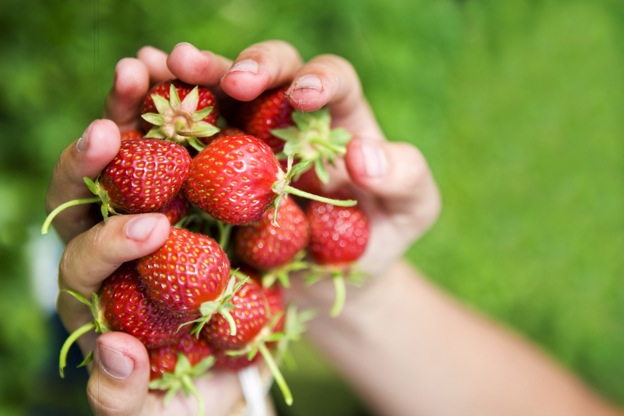Bountiful Berries: NEW Health Breakthroughs and Recipes

Spring is wonderful for many reasons, not the least of which is the return of fresh ripe berries. Every week, I hustle to my farmers markets to see what is waiting for me. Picked locally at their peak of ripeness, they are tender, sweet, and juicy - but they have a very short season, so get them while you can. I freeze them for when berry season is over.
There are very few foods that match the beautiful color and intense flavor of berries. And, fortunately, these fruits are nutrition superstars.
For many years, most berries were regarded as nutritionally inferior because of their lack of traditional essential nutrients such as vitamins A and C. But that was before scientists recently discovered the presence of large amounts of beneficial phytochemicals ("phyto" is Greek for plant).
Apparently, each berry contains at least 100 nutrients and phytochemicals, the plant compounds with potent powers of healing. Some of the most important phytochemicals in berries are antioxidants, powerful substances believed to reduce inflammation, improve immune function and help prevent heart disease and cancers.
Antioxidants are compounds that absorb oxygen free radicals -- molecules that cause oxidation in the body's cells. Scientists believe that these molecules cause most of the diseases of aging, such as immune system decline, arthritis, heart disease, cancer and neurological impairments affecting cognition and balance. Think of oxidation as being similar to rusting. Or imagine an apple slice turning brown. By simply adding lemon juice, an antioxidant, the apple's flesh stays fresh and prevents the browning or oxidation.
A similar thing happens in your body. Oxidation is constantly occurring in your cells because of environmental pollutants, smoking, exposure to the sun, heat generated through basic metabolic functioning, unhealthy diets and other factors. It takes a large supply of antioxidants to counter this. Berries have been found to have one of the highest antioxidant scores of all fruits and vegetables.h
But there are other good reasons to eat berries. The berry family contains 300 to 400 beneficial, disease-fighting chemicals. The phytochemicals in berries, depending on the type, also stimulate the immune system, reduce inflammation, enhance cancer-fighting enzymes, positively influence hormone metabolism, have antibacterial and antiviral effects and may even reverse some aspects of brain aging.
The most potent and cherries (not technically a berry, but similar nutritionally) but all more potent than most other fruits. Their color is provided by one of the most powerful phytochemicals, called anthocyanins, which berries synthesize to protect themselves from the elements.
Anthocyanins, a type of polyphenol (polyphenols are also found in other fruits and vegetables), reduce inflammation, according to a 2015 article in the American Journal of Clinical Nutrition, which plays a role in protecting against cancers, heart disease, and other chronic diseases. They may also play a role in preventing risk of Alzheimers and Parkinson's Diseases, according to many years of animal research published in a 2014 article in Neural Regeneration Research.
Cranberries, may be responsible for helping to prevent urinary tract infections, stomach ulcers, gum disease and even ear infections in children. Cranberries are also effective against antibiotic-resistant bacteria -- and 20 percent of urinary tract infections are resistant to antibiotics. The phytochemicals in cranberries work by blocking the disease-causing bacteria and preventing it from adhering to human cell walls.
"There is strong experimental evidence that cranberry bioactives have favorable effects on blood pressure, glucose metabolism, lipoprotein profiles, oxidative stress, inflammation, and endothelial (the lining of blood vessels)," said Jeffrey Bloomberg, et al, in the journal, Advances in Nutrition. But all berries have strong health benefits.
A study published in 2014 in the Journal of Nutrition found a reduction in insulin resistance, especially with Anthocyanins (found in abundance in berries). According to the study, these benefits can be "found with intakes readily achieved in the diet." They may even improve bone density in women, according to a study published in 2012 in the Journal of Bone Mineral Research and a 2014 article in Osteoporosis International. This may be caused by their antioxidant and anti-inflammatory properties, which may help prevent bone breakdown.
A study published in Neurology in 2012 found a high flavonoids diet (found in berries among other fruits and vegetables) was correlated with a reduction in the incidence of Parkinson's Disease in men.
Resveratrol
New research has found that raspberries, blueberries, cranberries and huckleberries contain a phytochemical called resveratrol, also present in wine, which is thought to help prevent cancer, cardiovascular disease, and is implicated as an important compound for health.
Strawberries contain large amounts of phytochemicals called ellagitannins, which are also in raspberries and blackberries. Studies at the UCLA Center for Human Nutrition found those berries are capable of inhibiting a number of key steps in the development of cardiovascular disease and may have immense potential for the prevention and treatment of heart disease and stroke. Strawberries are also high in antioxidant Vitamin C and folic acid, important in preventing birth defects.
"Strawberries contain a variety of bioactive compounds that can promote longevity and quality of life. For humans, these compounds can act as antioxidants, serve as anti-inflammatory agents, improve cell to cell communication, cause cancer cells to die, detoxify carcinogens -- a number of benefits consistent with health and disease risk reduction." said Dr. Burton-Freeman at an American Academy of Nutrition and Dietetics conference.
While most of what scientists know about berries has been determined in animal studies and in labs using cell cultures, new human studies are showing promising results.
